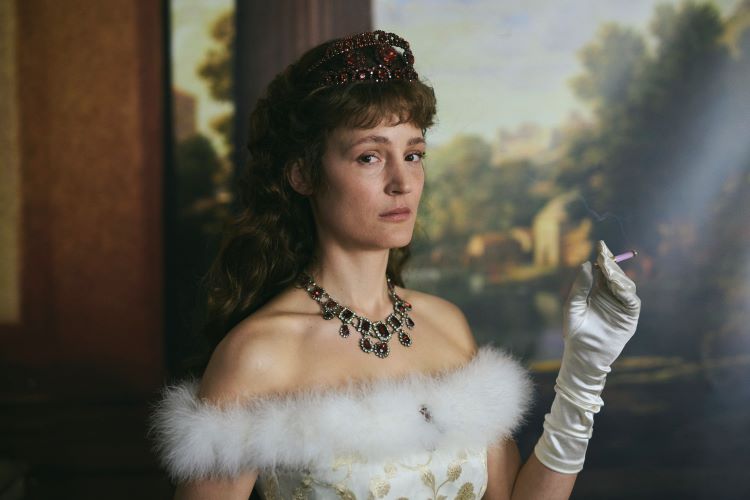
At once playful and incisive, Marie Kreutzer’s Corsage examines a critical time in the life of Empress Elisabeth of Austria (1837 – 1898), just as the Empress, renowned for her beauty, is turning 40. Vicky Krieps is magnificent in the role of Sissi, as the Empress Elisabeth was known. There is a strong feminist gaze in this luscious period drama that relies on the historical narrative and documented information yet imbues the portrait of Sissi with a contemporary sensibility and spirit. Visually sumptuous, and spiked with delightful anachronisms, exploring the pressures and constraints of a life lived in the public eye, Corsage is a vivid imagining of the woman behind the image.
Elisabeth is portrayed as a woman who actively sought to control her image, wearing tightly laced corsets (hence the film’s title) to create the desirable wasp waist, and dining on clear broths and two thin orange slices to maintain her slim figure. Historically, after the age of about 30, the Empress refused to have her portrait painted or photographed in order to maintain the illusion of eternal youth. The repeated images of Elisabeth bound into her corset, disappointed in the number on the measuring tape, and refraining from eating while others indulge, as well as the onslaught of judgements on her appearance from her husband, the Emperor Franz Joseph (Florian Teichtmeister), and others, form a cumulative indictment of a culture that judges and assigns value to women based on their appearance, while seeking to limit their power and ability to act in all other spheres. In that sense, the anachronisms scattered throughout the film transcend amusement to become pointed reminders to the complacent viewer that control over a woman’s body and the oppression of women that it enables, is not at all a thing of the past. It is interesting to note (although not explicitly mentioned in the film) that Elisabeth was married to Franz Joseph at age 16 and had three children by the time she was 21.
Although constraints of her position in society and her gender limit her ability to act, Elisabeth emerges as an intelligent, vibrant individual, whose energies are then channeled into what is possible. She rides, she exercises, she reads, she travels, and she controls what she can to the point of obsession, even if, as in her restrictive eating habits, those choices may be destructive. Kreutzer does not idealize her protagonist, Elisabeth’s narcissism and selfishness are depicted with brutal clarity. Making a gracious visit to an asylum, she stops by a man’s bed, speaking to the unresponsive inmate, she reminds him that on her previous visit he said she was beautiful, expecting a repeat of the compliment and dismayed at its absence. She expects not only total obedience from her ladies in waiting, but the complete submission of their lives to her wishes.
The rare moments when Elisabeth experiences power or pleasure are visually and sonorously resplendent. Original music by Camille graces the soundtrack – there’s a wonderful scene of Elisabeth’s slow motion power walk with her ladies in waiting and loyal hounds as she returns to the palace after resorting to feminine wiles to escape an awkward, and perhaps even painful, public moment. All this to the sound of Camille’s edgy She Was. Other uses of music to convey a redemptive feminist re-vision are more explicit, as Elisabeth and her cousin and confidant Ludwig dance while a courtier sings the 1970s country ballad Help Me Make it Through the Night. Yet while that scene felt somewhat jarring, a later scene effectively embeds the Rolling Stones’ As Tears Go By arranged for harp and vocals, and the lyrics resonate with Elisabeth as she sits in the garden of her summer residence.
Kreutzer’s previous film, The Ground Beneath My Feet (2019) focused on issues of mental health and the tensions of life as a woman in a male-dominated society, in Corsage these themes are explored on a grander scale, more playful, and with more hope, even if hope only resides in wild imaginings. Kreutzer and Krieps Empress Elisabeth finds a feeling of freedom in her encounter with Louis Le Prince (Finnegan Oldfield), who invented an early motion-picture camera. Although he is a true historic figure, it is not known that he ever met with the Empress or shot a motion picture sequence of her. But the dates work – Le Prince was born in 1841 and died in 1890, and with him, Elisabeth experiences a delicious freedom – she is in motion, and because the camera does not record sound, she is free to say whatever she likes. In this fictional black and white rendition of vintage footage, she is laughing, vibrant, free – a hopeful vision of what her life might have been.
Corsage
Austria, Luxembourg, Germany, France 2022 | 112 minutes | German, French, English, Hungarian | Hebrew, English subtitles
Director: Marie Kreutzer; Screenplay: Marie Kreutzer; Cinematography: Judith Kaufmann; Editor: Ulrike Kofler; Music: Camille; Cast: Vicky Krieps, Florian Teichtmeister, Katharina Lorenz, Jeanne Werner, Alma Hasun, Manuel Rubey, Finnegan Oldfield, Aaron Friesz, Rosa Hajjaj, Lilly Marie Tschörtner, Colin Morgan
Link to Corsage screening dates at the Jerusalem Film Festival





